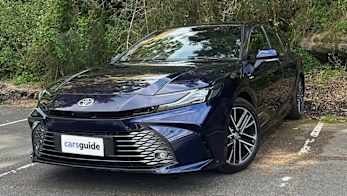There’s been a lot of noise about US President Donald Trump’s high-percentage import tariffs on everything from steel, copper and aluminium to timber, furniture and you guessed it, cars and car parts.
But it was his predecessor, Joe Biden that upped the tariff on Chinese electric vehicles from 27.5 per cent under the first Trump administration, to the current 100 per cent rate.
Not surprisingly, this slammed the brakes on the ambitions of Chinese carmakers for growth in the US, which has led to a pitched battle in the domestic market with manufacturing capacity and current output outweighing demand.
And China’s biggest carmaker, BYD has been reaching into its deep pockets to cut profit margins and drive a price war many believe is designed to put smaller players to the sword.
But it’s possible these heavy-handed tactics may be backfiring because for the first time since 2020 the rise and rise of BYD has faltered.
As reported by CarNewsChina BYD Group sales in China fell 5.9 per cent (to 393,060 units) in September, compared to the same month last year, following two months where year-on-year sales had been close to flat.
In particular, BYD’s plug-in hybrid numbers dropped 25.6 per cent last month, with sales now declining for six consecutive months since April.
But while the mother ship BYD brand has borne the brunt of the domestic downturn, its relatively small-volume sub-brands have gone the other way.
Fang Cheng Bao (off-road capable SUVs) grew 345 percent (to 24,121 units), Denza (premium models) was up 20.5 per cent (to 12,407 units) and Yangwang (super performance models) improved by 145 per cent (to 758 units) in September, YOY.
Of course, BYD has been aggressively seeking new market opportunities to fill a USA-sized export hole in its business plan. And Australia is clearly a target, as the brand has made a big impact locally in a stunningly short period of time.
Having recently switched from an importer/distributor arrangement to a direct factory subsidiary, BYD is now a regular top 10 new car player here (P8 year-to-date in 2025) with models like the Sealion 7 SUV and Shark 6 dual cab ute occupying an increasing number of Aussie driveways.
And there’s lots more on the way, with the Atto 2 small electric SUV and large three-row Sealion 8 PHEV both approved for local sale and expected to arrive before the end of the year.
But the next step is a flanking manoeuvre, using the Denza brand to expand BYD’s group-wide offering. And this week saw confirmation of a November arrival for the Denza B5 and B8 PHEV 4WD SUVs.
Marketed in China under the Fang Cheng Bao Leopard Series banner, the B5 is a mid-size plug-in hybrid riding on a full body-on-frame chassis powered by a 1.5-litre turbo-petrol four-cylinder engine and two electric motors for combined outputs of 505kW and 760Nm with a 1200km overall range.
Then, the larger, seven-seat B8, also a Fang Cheng Bao Leopard model in China, is a similar separate-frame 4WD powered by a 2.0-litre turbo-petrol engine and a pair of electric motors delivering 550kW/760Nm with a 1200km range.
Both feature a trio of diff locks, selectable terrain modes and generous ground clearance for serious off-road performance and the standard specification is sky-high with multiple media and instrument screens included in a premium interior fit-out.
Look out Toyota RAV4 and LandCruiser Prado!
BYD said this week it would offer a curated range of premium vehicles from BYD’s three acclaimed sub-brands in Australia under the Denza brand.
This means models from the Yangwang product portfolio will soon be on offer here. Most likely the front-engine, quad-motor U8 SUV; a large, five-seat ‘tank turn’ capable 4WD.
Stand by for more BYD and Denza new model news as the Chinese giant’s push into this market continues to build momentum.






.jpg)


.jpg)


.jpg)


.jpg)




.jpg)

.jpg)
.jpg)
.jpg)
.jpg)
.jpg)
.jpg)
.jpg)
.jpg)
.jpg)
.jpg)
.jpg)
.jpg)
.jpg)
.jpg)
.jpg)
.jpg)
.jpg)
.jpg)
.jpg)
.jpg)


.jpg)



.jpg)
